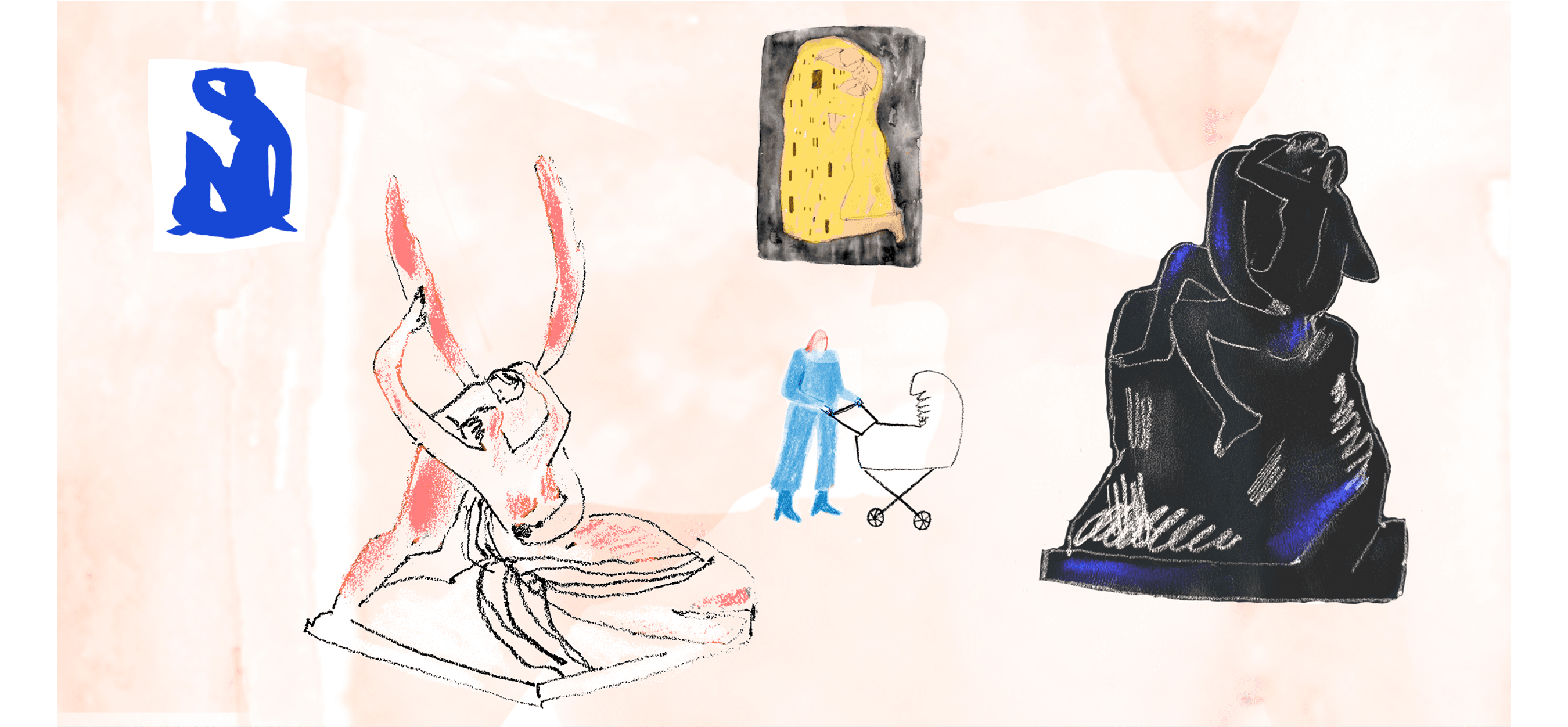
Relationships
How To Have Sex After Kids
With all the love and romance you felt with your partner to make your baby, once the amazing and tiny result of your actions is finally here, you may not be feeling up for intimacy — whether it’s directly postpartum or even beyond. Don’t worry, this is totally normal, and there are ways to cultivate sexual desire and arousal after having a baby if you want to.
- Written By
- Abi Berwager Schreier
- Illustration
- Danielle Rhoda
While most healthcare providers will tell you that you can have sex again four-to-six weeks after delivery, most moms aren’t ready even then. When you’re touched out and covered in spit-up, you’re breastfeeding, pumping, or just trying to figure out your new normal with a brand new little around, feeling close to your partner can seem like the furthest thing from your mind. And sex? Forget about it.
There are certainly tips and tricks to jump-start your sex drive, but what’s really important for a lot of folks when it comes to hitting the sheets is that feeling of intimacy and closeness with their partner. You’re both taking on a brand new role, whether you’re a first-time parent, or you’re adding another mini to the mix and now you have multiples. Sex after baby is tricky, but there are ways to navigate this new challenging time for your relationship.
Physical Reasons You May Lose Your Sex Drive After Baby
You’re recovering from so much after you give birth — your body did go through a lot of trauma after all, as beautiful and natural as childbirth can be. And if you had a cesarean, you’re also recovering from major surgery. Your body needs time to heal. “Women lose their sex drive due to the recovery after giving birth, breastfeeding, fatigue, hormone shifts during the postpartum phase, and mental health concerns such as postpartum depression,” says Dr. Lee Phillips, psychotherapist and certified sex and couples therapist. Plus, your body just may not be physically ready.
If mom experienced mild-to-severe perineum and vaginal tearing there could be pain with sex, and pelvic floor dysfunctions and injuries — such as a prolapse or overactive pelvic floor muscles — can also make sex extremely uncomfortable according to Brook Cates, CEO and founder of The Bloom Method, a company focused on women’s health postpartum.
Breastfeeding can be an issue as well, because when you’re breastfeeding, your uterus tightens because of the release of the hormone oxytocin, per the Mayo Clinic. There’s also the chance of potential leakage during sex because of that same oxytocin being released when you have an orgasm — which may not make you feel super sexy.
Hormones can also have a huge effect on libido — estrogen levels during and post pregnancy have a lot to do with your sex drive postpartum, according to Women’s Health Magazine. During pregnancy, the article noted that your body has a lot of estrogen floating around to create the best environment for your baby, and then it drops in the months and weeks after giving birth.
And these hormonal changes can affect your mood and mental health for sure.
Emotional Reasons You May Lose Your Sex Drive After Kids
Many new parents are also experiencing baby blues, postpartum anxiety, depression, and definitely exhaustion. “Due to sexual desire being a mixture of biology, physical, and emotional aspects, every woman is going to experience varied libido within the first year postpartum,” Cates says.
A recently updated study cited that one in seven women experience postpartum depression (PPD) — that’s a pretty large number. And that doesn’t even contend that most women who experience PPD go undiagnosed because of “conflict in privacy and not wanting to disclose to family members,” the study noted.
“While we don’t know the exact cause of PPD, we do know that there are certain factors that increase the likelihood that it will develop,” says Kaitlin Soule, LMFT, author, and speaker. “A few risk factors are previous struggle with depression or mood disorders, traumatic birth or postpartum experiences, a general lack of support, and genetic disposition.”
“Unfortunately, we live in a ‘bounce back’ society, that (sort of) gives moms six weeks to be back to their pre-child self and that's an unrealistic standard,” says Soule. “Birthing, however it's done, and becoming a mother is the biggest transformation of a lifetime, so it makes sense that the physical and emotional changes would shift our energy and desire,” she says.
So even beyond the postpartum period, it's common that women experience a longer term loss in libidio, Soule explains. “And most often women point to feeling touched out, burned out, tired, and like they don't have the time or energy for intimacy. It's not so much that mother's don't ‘want’ intimacy, it's that they don't have the capacity to tap into that part of themselves.”
Reconnecting with Your Partner and Tips for Getting Your Sex Drive Back Postpartum
Experts provided tips to build intimacy with your partner and increase your sex drive, so there is hope. First, Soule says it’s important to remember that intimacy is about support, and equal partnership can greatly increase our libido, making sex wanted and much better.
Share the load. “A recipe for intimacy is when both partners feel good in their skin, and have the mental and emotional capacity to consider each other,” Soule says. She suggests getting on the same page emotionally by making sure that you're sharing the load of domestic and care duties, thereby giving each other a bit more time and space to feel like a whole human.”
Partner Check-Ins. Phillips says, “I recommend making it a commitment by placing it on the calendar. Accountability is important. Regular check-ins can be done in 30 minutes to an hour every week to discuss the state of the relationship, but also what you miss about connecting and feeling close.” He adds that you can use these check-ins to talk about the sexy times you had in the past prior to your little. Topics you can include are things about sex that make you feel excited, things about sex that make you feel anxious, parts of the body you like to have touched, parts of the body that are currently off limits, and sexual acts you want to try, according to Phillips.
Doing Intimate Activities with Your Partner That Aren’t Sexual. Snuggling on the couch, sharing a delicious meal alone, and having deep conversations are intimate activities that will make you feel closer to your partner.
Show your partner appreciation. “Try to notice small things your partner does that you appreciate or admire, and take time to communicate this to your partner. This will make your partner feel valued and will remind you about your partner’s positive traits often (a good practice to instill since our brain naturally has a negativity bias).”
Reconnect with yourself. “Tapping into self-care can elevate the self-love needed to help shift libido,” Cates says. There are also studies that show if you masturbate, you can get your sexual desire back. Plus, you’ll find out what your likes and dislikes are again postpartum.
Keep physical, non-sexual intimacy alive. “Affectionate touch boosts the brain’s oxytocin levels and ultimately lowers stress and anxiety,” Phillips says. “Physical intimacy does not mean sex, but if you have sex, GREAT! It can also be hugging, cuddling, or kissing.” He adds that women tend to have responsive desire where physical closeness and sexual contact, such as touch, can spark the desire for sex, meaning that arousal can come first before desire.
Ask for help. Cates says asking for help with the minis is crucial so you can get some rest. The more energy you have, the more likely you’ll feel like yourself, and the more likely you’ll want to have sex.
Schedule Sex. With kids, life is pretty busy and it’s all about the calendar. Scheduling sex doesn’t have to be mechanical, in fact it can be pretty sexy. Mark a day or two in your calendar a week for when you’ll make an effort and plan to have sex. If your typical time to have sex is nighttime, and your bedtime routines are chaotic or you just can’t seem to get your little to stay in the bed, try for the morning before they get up or even when they nap on the weekends. You’re unconsciously getting your body in the mood in anticipation because you'll know it’s coming and that’s pretty exciting. Try sexting with your partner in the days leading up to it and the day of, and make plans for what you’ll do that night.
Reconnecting with your partner takes work, and throwing littles into the mix makes it that much harder. However, emotional and physical intimacy is crucial in healthy relationships. Once your body is physically ready for intimacy, these tips will make it easier to get your groove back.
Sources interviewed:
Dr. Lee Phillips, psychotherapist and certified sex and couples therapist.
Brook Cates, CEO and founder of The Bloom Method, a company focused on women’s health postpartum.
Studies cited:
Mughal S, Azhar Y, Siddiqui W. Postpartum Depression. [Updated 2022 Jul 20]. In: StatPearls [Internet]. Treasure Island (FL): StatPearls Publishing; 2022 Jan-. Available from: https://www.ncbi.nlm.nih.gov/books/NBK519070/
ABI BERWAGER SCHREIER

Abi is an Atlanta-based lifestyle and parenting writer reporting on children's books and toys, fertility, pregnancy, labor, breastfeeding, parenting, medical health, mental health, and pop-culture.
When she isn’t writing or copy editing, Abi loves being a mom to her 4-year-old son Jack, chugging coffee, cooking plant-based meals, working out, and spending time at home with the rest of her family — a husband, two cats, and two beagles.